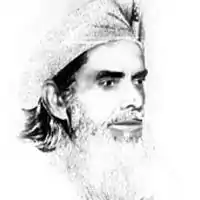Behzad Lucknavi
Behzad Lucknavi (born Sardar Hasan Khan; 1 January 1900 – 10 October 1974[1]) was a Pakistani Urdu poet and lyricist. He primarily wrote naats and ghazals and sometimes radio plays for the All India Radio, Delhi and later for Radio Pakistan after immigrating to Pakistan.
Behzad Lucknavi | |
|---|---|
 | |
| Born | Sardar Hasan Khan January 1, 1900 Lucknow, India |
| Died | October 10, 1974 (aged 74) Karachi, Pakistan |
| Pen name | Behzad Lucknavi |
| Occupation | Poet, Lyricist |
| Language | Urdu |
| Nationality | Pakistani |
| Genre | |
Prior to his migration from India, he used to participate in mushairas at an apparent age of twelve after Zulfiqar Ali Bukhari introduced him to the All India Radio.[2] He wrote lyrics for seventeen films, including Roti, Taj Mahal and Dhanwan.[3]
Biography
He was born as Sardar Hasan Khan on 1 January 1900 in United Province, British India (in modern-day Lucknow, India).[2] He initially worked in the Indian Railways[4] but later for the AIR at ₹120 per month. He was later employed by the Radio Pakistan where he used to recite naats as a part of congregational prayer. He also wrote some uncertain radio plays.[2] As a gazal writer, he contributed to the Urdu literature of Pakistan.[5] An Indian singer, Begum Akhtar earned her recognition after she sung her first gazal Diwana banana hai toh by Lakhnavi.[6] He also wrote lyrics, including "Mere Liye Woh Gham-e-Intezaar" for the film Anokha Pyar sung by Lata Mangeshkar.[7]
Publications
| # | Title | Year | Type/Credited as | Ref. |
|---|---|---|---|---|
| 1 | Haseen Qatil | 1924 | novel | [8] |
| 2 | Paidaishi Jasoos | 1925 | Novel | |
| 3 | Bete Ka Qatil | 1926 | Novel | |
| 4 | Mushaf-e-Bahzad | 1938 | — | |
| 5 | Behzad Lucknavi Ke Sau Geet | 1940 | Poetry | |
| 6 | Charagh-e-Toor | 1941 | Poetry | |
| 7 | Kufr-o-Iman | 1945 | Poetry | |
| 8 | Sana-e-Habeeb | 1954 | Poetry | |
| 9 | Wajd-o-Haal | 1955 | Poetry | |
| 10 | Aah Na Tamam | — | Poetry | |
| 11 | Aah Na Tamam | — | Poetry | |
| 12 | Aah-e-Natamam | — | Poetry | |
| 13 | Bahram Ki Wapsi | — | Novel | |
| 14 | Bustan-e-Bahzad | — | Poetry | |
| 15 | Kaif-o-Suroor | — | Poetry | |
| 16 | Mauj-e-Noor | — | Poetry | |
| 17 | Mauj-e-Tuhoor | — | Poetry | |
| 18 | Naat-e-Huzoor | — | Poetry | |
| 19 | Naghma-e-Noor | — | Poetry | |
| 20 | Naghmat-e-Bahzad Lakhnavi | — | Poetry | |
| 21 | Pili Chhatri | — | Poetry |
Filmography
| † | Remarks denote a short description of the work where available. |
| # | Year | Title | Lyricist | Dialogue | Screenwriter | Ref. |
|---|---|---|---|---|---|---|
| 1 | 1951 | Pyar Ki Baten | [3] | |||
| 2 | 1951 | Ada | ||||
| 3 | 1950 | Khel | ||||
| 4 | 1950 | Pagle | ||||
| 5 | 1950 | Wafa | ||||
| 6 | 1949 | Ladli | ||||
| 7 | 1949 | Nisbat | ||||
| 8 | 1948 | Aag | ||||
| 9 | 1948 | Anokha Pyar | ||||
| 10 | 1947 | Andhon Ki Duniya | ||||
| 11 | 1947 | Jadui Ratan | ||||
| 12 | 1946 | Dhanwan | ||||
| 13 | 1943 | Poonji | ||||
| 14 | 1942 | Zamindar | ||||
| 15 | 1942 | Roti | ||||
| 16 | 1941 | Taj Mahal | ||||
| 17 | 1931 | Dhanwan |
Personal life
He spent his last days in difficult circumstances due to financial crisis and medical complications. He then submit a request to the Karachi Municipal Corporation for financial assistance, for which was given PKR1,000 for his surgery. The commissioner of Karachi later offered him a government job at primary school as a teacher but he refused the post.[9] He died on 10 October 1974 in Karachi, Pakistan.[4]
References
- "Behzad Lucknavi biography and information". Cinestaan. 1 January 1900. Retrieved 14 September 2020.
- "بہزاد لکھنوی". express.pk. (in Urdu)
- "Behzad Lucknavi movies filmography".
- "Behzad Lakhnavi Poetry - Urdu Shayari, Ghazals, Nazams & Poems". UrduPoint.
- "LITERARY NOTES: Focus on Naatia poetry". Business Recorder (newspaper). 13 November 2004. Retrieved 23 October 2021.
- Anasuya, Shreya Ila (5 October 2019). "Memories of Akhtari". mint.
- "When Anil Biswas gave Lata Mangeshkar her first hit with 'Mere Liye Woh Gham-e-intezaar' – Death anniversary special".
- "Urdu Books of Behzad Lakhnavi". Rekhta.
- Salman, Peerzada (21 January 2019). "This week 50 years ago : Protests and Behzad Lakhnavi". DAWN.COM.